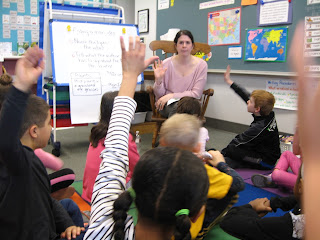Some days, it can feel really good to stretch in these ways. I can see the pride in the boys' and girls' eyes; hear it in their voices as they share their plans and their progress with each other. But some days - truth be told - it can be exhausting. As their teacher, I walk a fine line between patience and pushing them to persevere. In the end, I know that they will get over these hurdles - and they'll be better for it. Stronger, smarter, and more ready to take on third grade.
I have never been one to coast to the end of a school year. I like to keep the class busy and engaged. But once over our current hurdles, the last few weeks of second grade will have a less pressured feel, I think. A bit like a light at the end of a tunnel. Looking ahead in reading and writing, we'll turn our attention to the joys of poetry. In math, the boys and girls will be learning mostly about symmetry, fractions, and measurement. These math topics generally lend themselves to a more fun, hands-on approach. As our math load gets a little lighter, we'll have more time for science. We'll finish our work with solids and liquids and then investigate plants and insects. We'll have two great field trips - a walking tour of downtown Milwaukee on May 25 to compliment our social studies lessons and a visit to the Boerner Botanical Garden on June 6 that connects to our science work. I love the idea of wrapping up our time together as a class in these happy ways.
Thank you so much to the many families who helped to put books from this week's Stormonth Book Fair into our classroom library. The Book Fair profits and Coin Wars donations were divided equally among the staff. Add to that gift certificates that some families purchased and I received about $120 to spend on books like the popular Dogman and Owl Diaries series, as well as some interesting non-fiction titles. The class is thrilled!
Mark Your Calendars:
Thurs. May 11 - Visit with author Lester Laminack sponsored by the PTO
Fri., May 12 - PTO-sponsored Special Interest Day (PM)
Fri., May 12 - PTO-sponsored Special Interest Day (PM)
Thurs., May 18 - Safety Day with the Fox Point Police Department (AM)
Fri. May 19 - Class mini-concert during Music (12:20-12;50 PM)
Wed., May 24 - Early release day for students
Thurs., May 25 - Field trip. Walking tour of downtown Milwaukee. A letter and permission slip will be sent home shortly.
Mon., May 29 - Memorial Day. No school.
Fri. May 19 - Class mini-concert during Music (12:20-12;50 PM)
Wed., May 24 - Early release day for students
Thurs., May 25 - Field trip. Walking tour of downtown Milwaukee. A letter and permission slip will be sent home shortly.
Mon., May 29 - Memorial Day. No school.
















